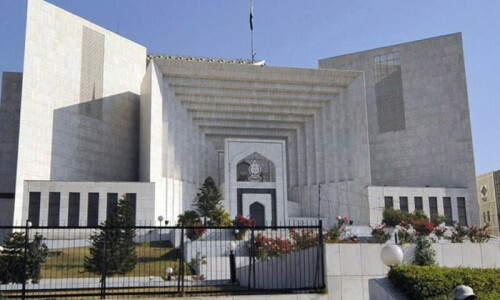PESHAWAR: The largest local government elections in Khyber Pakhtunkhwa’s history were held on Saturday amid sporadic incidents of violence, mismanagement and complicated balloting that left voters confused. The violence claimed five lives in Charsadda.
Chief Minister Pervez Khattak held the Election Commission of Pakistan (ECP) responsible for brawls, violence and chaotic situation at polling stations.
“The government had handed over police and security forces to the Election Commission to ensure peaceful elections,” he said while talking to reporters after casting his vote in his native constituency in Nowshera.
Mismanagement, complicated balloting process mar the exercise; women in parts of Dir didn’t vote
Voting at majority of polling stations was marred by problems including non-availability of electricity, lack of training of polling staff, voters’ lack of awareness about the voting system, lax security and time-consuming voting process.
Women in many areas of Dir Upper and Dir Lower districts didn’t vote.
All the five deaths took place in Charsadda district. Maqsood Jan and his brother Murad Khan were killed in China Ward and Mir Afzal Dhakki Ward. They were workers of the Qaumi Watan Party.
Two persons were killed in Sherpao village.
Around 50 people were injured in incidents of violence, including 30 in Peshawar.
Enthusiasm among the voters was unprecedented and a large number of men as well as women turned up to vote, but they faced a tedious process of casting six ballots, standing in long queues that took them more than an hour to reach the ballot box in suffocating small rooms in polling stations amid power cuts. There were seven ballot papers in areas having seats reserved for religious minorities.
Voters were found complaining about poor arrangements.
A large number of voters were seen returning home without casting their votes to avoid chaos.
Presiding officers at several polling stations blamed police for failing to ensure order.
“Police are acting like silent spectators. We asked them several times to maintain order among the voters but in vain,” a polling official told Dawn. He said he had performed duties in many elections but his one was the worst.
By 12.30pm only 90 votes out of 461 had been polled at a polling station because of the slow process. The voters accused the polling staff of being slow in verifying the names and signing the ballot papers. Shortage of polling staff was another major issue.
Voting at several polling stations began up to an hour and a half late after the staff waited for election material.
The ECP had set up 11,211 polling stations in the 24 districts of Khyber Pakhtunkhwa except Kohistan -- 4,724 joint and 3,428 for men and 3,059 for women.
The elections were not held in Kohistan because the district’s bifurcation had been challenged in the Peshawar High Court.
The total number of registered voters was 13.1 million and 11,403 presiding officers had been deputed along with 95,646 assistant presiding officers and 31,882 polling officers.
ECP’s data showed that 88,420 candidates contested the elections, including 77,033 for village and neighbourhood councils. Of them, 39,079 were in the run for general seats, 15,700 for reserved seats for peasants, 14,224 for youths, 7,681 for women and 349 for non-Muslims.
Published in Dawn, May 31st, 2015
On a mobile phone? Get the Dawn Mobile App: Apple Store | Google Play















































